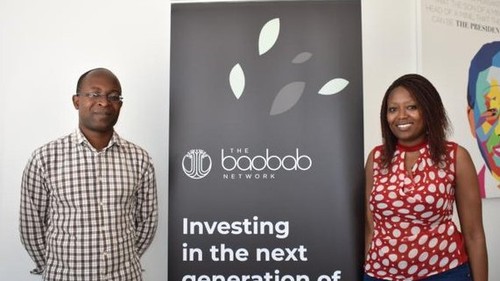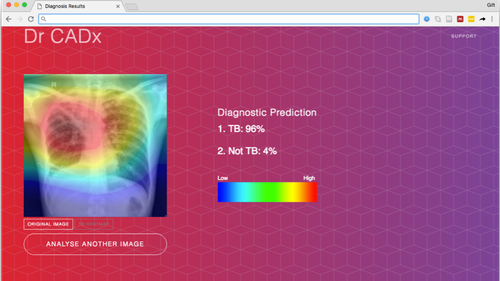Hot startup of the month: Zimbabwe's Dr CADxHot startup of the month: Zimbabwe's Dr CADx
Zimbabwean startup Dr CADx has developed a diagnostics system that is harnessing the power of AI to help doctors remotely diagnose medical images.

Africa's health-tech sector is booming, with the number of startups operating in the space and the amount of investment flowing into it reaching record highs.
This is according to the High Tech Health: Exploring the E-health Startup Ecosystem Report 2020 from African startup ecosystem news and research platform, Disrupt Africa, which found there are now 180 e-health startups operating across the continent.
Moreover, the sector is set for a big boost from the COVID-19 crisis, with behavioral changes linked to the pandemic speeding uptake of tele-health solutions. Founders are reporting years' worth of growth taking place in just weeks due to the coronavirus, as people avoid physical appointments and become more aware of their health.
Gift Gana is co-founder of Zimbabwean startup Dr CADx, which has developed a computer-aided diagnostics system that is harnessing the power of artificial intelligence (AI) to help doctors diagnose medical images more accurately, at a low cost, and remotely.
"Generally, we see that the COVID-19 pandemic has helped greater appreciation of the use of technology to shape how people work, including in the healthcare sector. Where previously practices did face-to-face interactions with patients, they have moved to tele-consultations for cases where that is feasible. So, it has brought about a positive change of mindset in using digital technologies, which we foresee will help in the adoption of our solution," he said.
Dr CADx's solution was created to tackle the serious scarcity of radiologists, especially in developing countries. In Zimbabwe there are only 17 radiologists serving a population of about 16 million, giving a ratio of just one radiologist for every million or so people, as compared to 1:9,000 in the US.
"Additionally, none of these are employed in the public hospitals that serve most of the population. This scenario is the same across many African countries, and some countries don't even have a single radiologist," Gana said.
"As a result, annually an estimated 45 million patients in Africa do not have access to a radiologist to review their medical images. Misdiagnosis results in patients frequently failing to get the right treatment on time, leading to undue suffering and even death."

The doctors view on the Dr CADx platform.
Dr CADx addresses this, making use of AI to develop a software solution that augments the capabilities of doctors to achieve more accurate interpretation of medical images.
"By deploying an artificial intelligence system that will be available at any given time of the day – even in remote areas – we will greatly improve the quality of patient management and save lives, especially in the marginalized areas of the developing world," Gana said.
The startup has developed a prototype that can analyze chest X-rays for TB and 14 other chest pathologies, including pneumonia lung cancer nodules and pneumothorax. A pilot validation study for TB showed a standalone accuracy of Dr CADx against the GeneXpert gold standard as 96%, and doctor accuracy improved. A test on the other 14 chest findings yielded an average accuracy of 84%, which is comparable to expert radiologist level performance.
Investment woes
Yet the fact the startup is still only at the prototype stage speaks to wider challenges within the health-tech space which pre-date COVID-19 and will remain after the virus has been vanquished. Dr CADx was founded in 2016, yet it is still not on the market. Gana blames lack of investment for the delay.
"Whilst some of our tools have been ready for validation in clinical studies, getting sufficient funding to finance them or collaborating partners to take off the costs has not been easy. So, we have moved at a slower pace than we had planned," he said.
This is a common thread for healthcare startups on the continent, leading to much churn. According to Disrupt Africa's research, the growth in the number of African e-health startups to 180 from 115 in 2017 was not as simple as 65 new businesses opening their doors in the interim. Forty of the 115 startups active in 2017 – 34.8% of the total tracked by the first edition of the report – are now, for whatever reason, no longer in business. Lack of available funding, as well as concerns over the spending power of health-tech startups' target market, are key to this.
Dr CADx is finally raising the funding it needs, having joined the Baobab Network accelerator last year, through which it secured some investment and support in obtaining follow-on cash. It is raising a US$125,000 funding round that Gana expects to close by the end of August.
"The funding is mainly for the clinical studies, and the rest will be for the commercial launch," he said. "We plan to start by rolling out in Zimbabwe in the first half of 2021 and into Nigeria and/or Zambia in the second half. Then expand to Kenya and South Africa in 2022."

Dr CADx co-founders Gift Gana and Tatenda Madzorera.
Raising the investment it needs in 2020 makes Dr CADx part of a wider trend within the e-health sector in Africa. The Disrupt Africa report found that more than half the sector's total funding since January 2015 was raised in the first six months of 2020. Twenty e-health companies have banked over US$90 million this year so far – which is 53.3% of all health-tech funding in the last 5.5 years.
A beneficiary of this increased interest in the space, Dr CADx is now looking forward to finally launching commercially at home in Zimbabwe, and in other African countries. Two clinical studies are set for Q3 of this year, at their conclusion Gana expects to start deploying Dr CADx's solution for chest X-rays into clinical use early next year.
"We plan to grow our presence to five or six African countries by the end of 2022. In addition to analysis of chest X-rays we will extend our solution to also analyze CT scans, mammography, ultrasound and MRI," he said.
He is confident of quick growth as there is notable evidence of health-tech adoption across the board.
"Electronic hospital management systems are being deployed in both public and private healthcare institutions. Supply chain innovations are being introduced, such as through drone deliveries in Rwanda and Ghana. Mobile health apps to improve communication with, and share information with, patients are seeing notable uptake," said Gana.
At this point, uptake is still at the early-adopter stage, so there is potential for even greater adoption in the coming years, he believes.
"A number of potentially game-changing health-tech solutions have been deployed in a handful of countries, and some are just pilots, so there is still a huge opportunity to scale them across Africa.
"Looking at our specific sector for computer-aided diagnosis, there is currently very little activity. Previous approaches to cover the radiology gap have been to use teleradiology, but it is not scalable as there are not enough radiologists to be at the other end. Widescale deployment of computer aided diagnosis in Africa will lead to positive impact for up to 45 million patients annually," Gana concluded.
Related posts:
_(1)_(1).jpg?width=700&auto=webp&quality=80&disable=upscale)
.jpg?width=700&auto=webp&quality=80&disable=upscale)
_(1).jpg?width=700&auto=webp&quality=80&disable=upscale)

.jpg?width=700&auto=webp&quality=80&disable=upscale)
.jpg?width=700&auto=webp&quality=80&disable=upscale)
_(1).jpg?width=700&auto=webp&quality=80&disable=upscale)
.jpg?width=700&auto=webp&quality=80&disable=upscale)

.jpg?width=700&auto=webp&quality=80&disable=upscale)